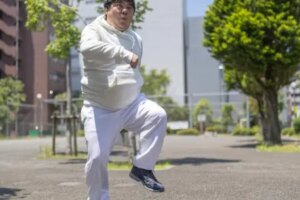
SINGAPORE – When Mr Ryan Lim, 32, was born, he was so big and healthy his parents nicknamed him “Ryan the giant”.
While he continued to grow physically, at around the age of two he began to lose his speech, and was later diagnosed with autism.
Despite his impediments to speech and learning, Mr Lim remained physically healthy through his childhood and early adulthood until 2019, when he began losing control of his emotions and started lashing out more frequently.
Although these happened occasionally before, by 2021 he was having “meltdowns” more than four times a day. During these episodes, he would either freeze on the spot, unable to move, or claw at his father, leaving Mr Roland Lim with wounds on his arms.
His family, which includes his mother Rosalind Lim and younger sister Rachael, was at a loss. They did not want to send Mr Ryan Lim to the hospital as they knew from past experiences that he would have difficulty communicating with doctors and receiving treatment – he once needed six people to hold him down to get stitches.
“We did not know whether it was a mental issue, we did not know whether it was a behaviour issue, but everybody was tired,” said his father.
A breakthrough came only at the end of 2021 when the family was introduced to Dr Chen Shiling, who worked with adults with intellectual disabilities.
She noticed that Mr Ryan Lim’s behaviour tended to worsen during meal times and when it was time to use the toilet.
Dr Chen later diagnosed him with irritable bowel syndrome (IBS) – a condition which causes pain and discomfort in the abdomen. She also introduced him to a dentist, who removed some teeth that were rotten. His condition improved tremendously after he started treatment.
“In Ryan’s case, (his meltdowns were) because he was in pain, it was because he was depressed, it was because he couldn’t fully communicate his needs,” Dr Chen said.
Today, his IBS is under better control, and he put on 10kg after Dr Chen introduced the family to a dietician.
Looking back, Mr Roland Lim feels bad that the family did not understand his son. “We thought it was a behavioural issue. But actually, he was in extreme pain.”
Mr Ryan Lim’s experience is not unique.
Despite his impediments to speech and learning, Mr Ryan Lim remained physically healthy through his childhood and early adulthood until 2019, when he began losing control of his emotions and lashing out more frequently.
ST PHOTO: NG SOR LUAN
Medical practitioners, family members and others working with people with intellectual disabilities said many like him face significant barriers to getting diagnoses and treatment.
It is difficult for them to communicate with doctors, especially if they are unable to speak.
Healthcare services may not be very accommodating to people with an intellectual disability like autistic spectrum disorder (ASD), who tend to be sensitive to noise or crowds, said Dr Giles Tan, senior consultant and assistant chairman of the Institute of Mental Health (IMH) medical board.
This means it is hard to get medical assessments or investigations done.
They may experience “diagnostic overshadowing”, where their health problems are attributed to their pre-existing condition – ASD in Mr Lim’s case – rather than another underlying medical issue, he added.
Even if they do seek help, many face barriers going for follow-ups, said Dr Wei Ker-Chiah, senior consultant and head of adult neurodevelopmental service at IMH.
“Many patients face a lot of difficulties trying to get out of the house, taking public transport – even getting to a hospital,” he said.
Some have behaviours that are quite difficult to manage and have trouble even leaving home, Dr Tan said.
Families also continue to face stigma, and may not want to bring people with an intellectual disability into public healthcare settings, he added.
Navigating the healthcare system can be difficult not only for people with intellectual disabilities, but also for their caregivers.
Two years ago, Mr SY’s 50-year-old sister with Down syndrome began to slow down and have mood swings – no longer the “bubbly girl” she used to be, he said.
She was eventually diagnosed with dementia, but like Mr Lim’s family, Mr SY did not have an easy time getting there.
He went to multiple doctors across various disciplines, racking up more than 10 visits to polyclinics and hospitals – because his sister was not able to communicate well.
“If you ask her, ‘Do you feel pain?’, she may say no. Five minutes later, if you ask her again, she may say yes,” he said, adding that every medical visit was complex and taxing for him.
His sister needs help walking and cannot be left alone, and he had sole responsibility for coordinating and financing her care.
Hospital staff were not always able to help her, and navigating the system alone was exhausting, said Mr SY, who declined to give his full name.
Although there were subsidies available, he was not always able to access them because he did not know what he could tap.
This is a gap, he said, adding that the responsibility of caring for those with intellectual disabilities will always fall squarely on family members.
“I know there are a lot of families who in the end send them to a home and wash their hands of everything.”
Jalan Besar GRC MP Denise Phua, who is president of the Autism Resource Centre, said these barriers to healthcare result in fewer people with intellectual disabilities taking up vital screenings and health promotion initiatives.
This in turn leads to poorer health for this group, which directly limits their daily activities, social participation and overall well-being.
The healthcare system also bears a higher cost of treating advanced, preventable conditions due to a reactive approach, Ms Phua added.
But new programmes have sprung up over the years in a bid to plug these gaps.
Over the past 10 years, Ang Mo Kio Polyclinic has been working with various groups, including social service agency Minds, to improve services for people with intellectual disabilities.
Minds also runs a clinic for these individuals, providing referrals and screenings.
Ang Mo Kio Polyclinic is working on a more “intentional, patient-centred” approach for this group, said Dr Dominique Phang, a family physician at the polyclinic who is in charge of some of its initiatives for them.
“Within our existing capacity, the trained family physician is able to interact with them longer and effectively use visual communication, provide a quieter waiting area, and prepare them before visits.”
She added that staff are trained to exercise patience and empathy, and communicate clearly.
“Looking ahead, we aim to continue refining this approach, deepening partnerships with persons with disabilities and sharing our learnings across the system so that healthcare is much more accessible and less stressful for both patients and families.”
But there is no specific course to prepare one for this work, said Dr Phang, herself a mother of two boys with ASD.
“Skills such as patience, empathy, and the ability to truly seek first to understand are caught, not taught. They grow through repeated exposure and meaningful engagement with patients and caregivers.”
New models are also expanding to better deal with the complexity of the issue.
Dr Chen – Mr Ryan Lim’s doctor – in 2022 established a charity known as Happee Hearts Movement and a clinical service named IDHealth, which are targeted specifically at this group.
IDHealth now has 27 staff and has supported 480 patients and 1,040 caregivers.
IDHealth is partly funded under a pilot by the Tote Board Community Health Fund under the Agency for Integrated Care and the Ministry of Health.
Since 2024, it has started providing healthcare for residents in adult disability homes after receiving a pilot grant from SG Enable – the agency which coordinates disability inclusion in Singapore.
IDHealth will soon also run more pilots including preventive health, dementia and palliative care services for people with intellectual disabilities.
Dr Chen approaches care for these individuals from multiple disciplines, looking at their physical health, mental health, oral health, sensory needs and communication needs.
IDHealth also enrols patients’ families if they have complex health needs – for example, Mr SY’s 86-year-old mother, who also has dementia, has been enrolled along with his sister.
He has also been assigned a nurse and social worker – who has been helping him to navigate the system – as well as other allied health professionals, like an occupational therapist to arrest the decline in his sister’s ability to walk.
Her condition has stabilised, though it has not improved.
“Not every illness can be treated, we understand,” he said.
“But the emotional and the financial part is one of the biggest burdens during these two years – when you don’t know where to seek help.”
Ms Phua said there are other initiatives by agencies like ActiveSG to improve the overall health of people with intellectual disabilities.
But more work can be done – on both the policy and legislative level, she said.
Ms Phua called for Singapore to legislate and fund the universal adoption of accessible health information and “reasonable accommodations”, referring to adjustments to services to enable people with disabilities to access them.
“Ultimately, we must stop treating disability inclusion in health as an afterthought and start building it as the foundation of our healthcare system,” she said.





